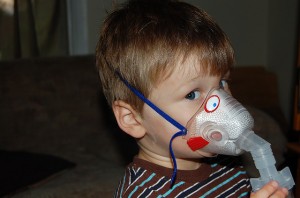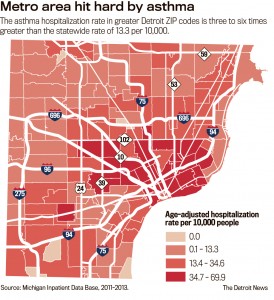Help us tell the DEQ: Michigan families aren’t guinea pigs

For more than a year MEC has been sounding the alarm about the state’s plan to deregulate emissions of some 500 toxic chemicals into Michigan’s air.
With just over a week left in the public comment period on this dangerous proposal, we are urging Michigan residents to speak up with a clear message to the Department of Environmental Quality: We are not guinea pigs.
Below we explain the state’s proposal and share some of our chief objections to it. Please take a moment to go on the public record with your opposition to rolling back these important protections for the health of Michigan residents. Feel free to use the language we’ve provided below. You have until Dec. 18 to email those comments to [email protected].
What the rule change would do
The draft policy would deregulate about 250 chemicals that have not been tested for their health impacts. Michigan’s current regulations protect public health by assuming any chemical whose effects are unknown is very toxic, and only allows them to be emitted in relatively small amounts. Without testing, state regulators can’t say with any certainty that these chemicals don’t cause cancer. In effect, the rule change would let polluters treat Michigan residents like guinea pigs.
Also concerning is the proposed deregulation of roughly 250 chemicals that are known to be toxic, despite not being linked to cancer. A chemical’s human health impact is a function of both its toxicity and the quantity emitted. The proposal eliminates quantity from that equation. It arbitrarily draws a line allowing unregulated emission of what are currently considered the least toxic 25 percent of chemicals that have been studied.
You can read more about the rule change in the Detroit News opinion piece MEC President Chris Kolb recently authored with Guy Williams of Detroiters Working for Environmental Justice. (If you want to really dive deeply into the subject, here’s a background report we prepared last  year.)
year.)
As we noted in the News,
The state’s proposed deregulation of some 500 chemicals would pack a potent punch in Detroit, where many people live in the shadow of heavy industry, and where asthma puts residents in the hospital three to six times as often as in the rest of Michigan.
Yet, the department’s plan for gathering input on the proposed deregulation does not include any public meetings in Southeast Michigan — the state’s most populous region, and one with serious air quality concerns. We find that outrageous.
How you can help
Below are a few of the key points MEC Policy Director James Clift made when he testified earlier this week at a public meeting on the proposed rule change. MEC and several of our member groups will also submit these and other concerns in our public comments.
We encourage you to include all or some of these comments—along with any other concerns you have— in an email to the DEQ. Again, that email address is [email protected].
If you’re really pressed for time, you can also voice your opposition to deregulating air toxics by signing our petition, here.
By taking a moment to submit your public comments—and urging your friends and family to do the same—you’ll strengthen our effort to halt this proposal and protect public health. Thank you for taking the time to stand up for clean air and to remind the DEQ that its primary mission is to protect the health of Michigan families.
Key concerns re. Air Toxic Rule Changes, ORR 2014-153 EQ and ORR 2014-154 EQ
- The changes fail to protect the health of Michigan families. Under the proposal, industrial facilities will be allowed to emit chemicals that have not been tested for their impact on human health or natural resources. This makes Michigan families the equivalent of guinea pigs. The company using the chemical (and reaping the financial benefits of its use) should bear the burden of demonstrating it is safe before emitting it into the air we breathe. Instead, this proposal transfers to those living next to the factory the risk that the chemical can cause cancer or have other negative consequences.
- The change ignores the science of toxic chemical exposure. The proposal to deregulate chemicals for which no health or safety data exists goes against our knowledge of toxic chemicals. The current program, at least, creates a presumption that an untested chemical is fairly toxic. The other chemicals being deregulated are those that have been found not to cause cancer and are less toxic than other chemicals, but which can still have impacts on public health. These chemicals have a wide variety of impacts including respiratory impacts and links to liver or kidney diseases. The potential impact on human health is driven by both the toxicity of the chemical and the quantity of the chemical being emitted. The second category ignores this question of quantity and deregulates a chemical based solely on its toxicity. This change is also contrary to the science behind protecting people from the impacts of toxic chemicals.
- The changes will have a disproportionate impact on low-income areas and communities of color. Numerous studies have shown that residential neighborhoods next to industrial areas tend to have below-average income and have a greater likelihood to be communities of color. By deregulating more than 500 chemicals the proposal will have the greatest impact in those communities with the highest concentration of industrial facilities and toxic air emissions. Further deregulating individual toxic chemicals will place these communities at even greater risk.
Asthma map courtesy Detroit News.
Boy with asthma photo courtesy KristyFaith via Flickr.
Comments are closed.




Deregulation of 500 toxic chemicals in Michigan will have devastating consequences on the health of Michigan citizens, especially children and is unconscionable.